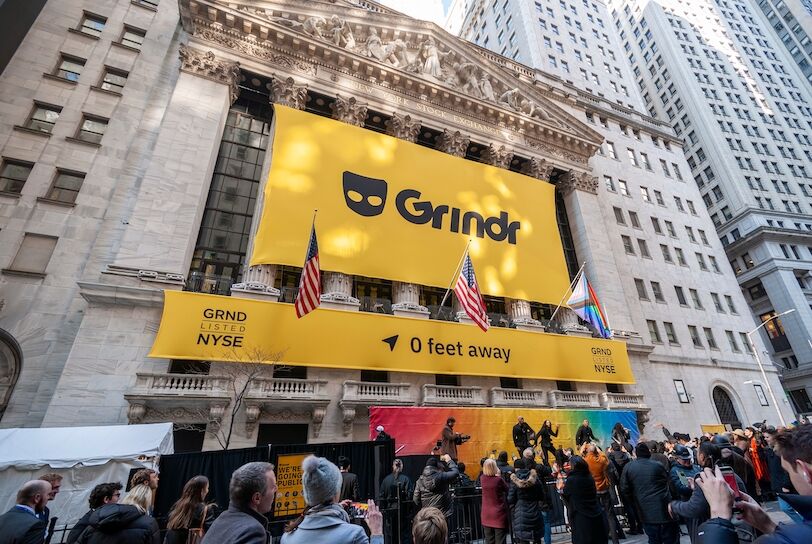
A Grindr banner on the the New York Stock Exchange building in November 2022 Photo: Shutterstock
Over 670 Grindr users in the U.K. are suing the queer hook-up app for allegedly and non-consensually sharing their “highly sensitive” private information — including ethnicity, orientation, and HIV-status — with third parties for commercial purposes. Grindr has denied the allegation, but it’s not the first time the app has been accused of potentially harming users.
The lawsuit — filed in London’s High Court by the class-action legal firm Austin Hayes — alleges the sharing occurred between 2018 and 2020 with the analytics companies Apptimize and Localytics, and potentially affected thousands of users, according to the law firm, NBC News reported. The lawsuit seeks £100,000 ($123,552) in total, according to the BBC.
Related:
While Grindr admitted in 2018 that it shared user data with Apptimize and Localytics, it said the companies were paid to monitor people’s app use to improve the app. Grindr defended the practice as in line with industry standards but said it stopped sharing HIV data with the companies.
Global perspectives delivered right to your inbox
Our newsletter bridges borders to bring you LGBTQ+ news from around the world.
“Grindr owes it to the LGBTQ+ community it serves to compensate those whose data has been compromised and have suffered distress as a result, and to ensure all its users are safe while using the app, wherever they are, without fear that their data might be shared with third parties,” said Chaya Hanoomanjee, the law firm’s managing director.
In response to the lawsuit, Grindr said it plans to “respond vigorously to this claim, which appears to be based on a mischaracterization of practices from more than four years ago.”
The accusation is similar to claims made in a January 2020 report by the Norwegian Consumer Council. The report accused Grindr of violating the European Union’s General Data Privacy Regulation rules by sending user data to at least 135 advertisers, including users’ locations and device information that could be used to non-consensually out users. The council fined Grindr €10 million for its alleged violation.
In 2022, the Information Commissioner’s Office, a data watchdog agency in the U.K., said that Grindr had failed to “provide effective and transparent privacy information to its UK data subjects in relation to the processing of their personal data.” A report from The Wall Street Journal, published that same year, found that precise location data on Grindr users was .
Grindr has also faced other accusations of compromising user security in the past.
In 2017, Matthew Herrick, a gay waiter in New York City, sued Grindr alleging that the app didn’t adequately respond after he complained over 50 times about an ex-boyfriend using the app to create fake profiles showing Herrick’s face, addresses, and phone number. Courts dismissed the case.
In 2019, the Committee on Foreign Investment in the United States (CFIUS) said the app’s purchase by Chinese gaming company Beijing Kunlun Tech Co Ltd presented a “national security risk.” In 2020, Kunlun announced that it would sell its stake in Grindr to the U.S.-based company San Vicente Acquisition LLC.
In 2021, Grindr began an investigation after a right-wing Catholic website used app data to out a priest. Grindr denied a data breach and doubted whether the website had somehow located “de-anonymized data” through the app or its commercial partners.
In 2023, the international organization Human Rights Watch (HRW) accused Grindr and other social media platforms of not doing enough to prevent the persecution of LGBTQ+ users by anti-LGBTQ+ officials in Africa and the Middle East who used the app to digitally target and entrap users. Grindr isn’t available in numerous Middle Eastern countries. The company has said that it has taken additional measures to protect users in countries with anti-LGBTQ+ authorities.
Grindr has an estimated 13 million monthly users, including 924,000 people in the U.K. In 2021, Grindr launched “Grindr for Equality,” an initiative to provide users with education on “health, pandemics and outbreaks… racial issues, gender, [education], safety, holistic security and privacy, and more.”
Studies have also found that gay men are turning to Grindr chats for mental health support from their peers.

